
Photo credit: The Nature Conservancy (TNC)

It’s fair to say that in 2022 the staff team helped set new directions for our work that will help guide us for the next several years.
Nina Idemudia, AICP, Chief Executive Officer
Dear friends,
I’m pleased to present my first annual report as Center for Neighborhood Technology’s new Chief Executive Officer. While this report highlights 2022 achievements, which seem far in the rearview mirror, it’s worth noting these highlights very much set the stage for this year’s work.
In fact, it’s fair to say that in 2022 the staff team helped set new directions for our work that will help guide us for the next several years, including:
I’m excited for you to read more about this work—if it fires up your imagination or inspires an idea for a new tool or partnership, so much the better! Please follow up directly with me or a team member if you have questions or ideas about anything in this document.
I should add one more thing: this report offers highlights, not an exhaustive record of the staff’s accomplishments last year (let alone since 2023 started). It’s literally the tip of the iceberg.
As the newest CEO at one of the most innovative organizations anywhere, I hope you’ll let me know your thoughts and suggestions about this report and the future of Center for Neighborhood Technology. Thanks for reading.
Nina Idemudia, AICP
Chief Executive Officer
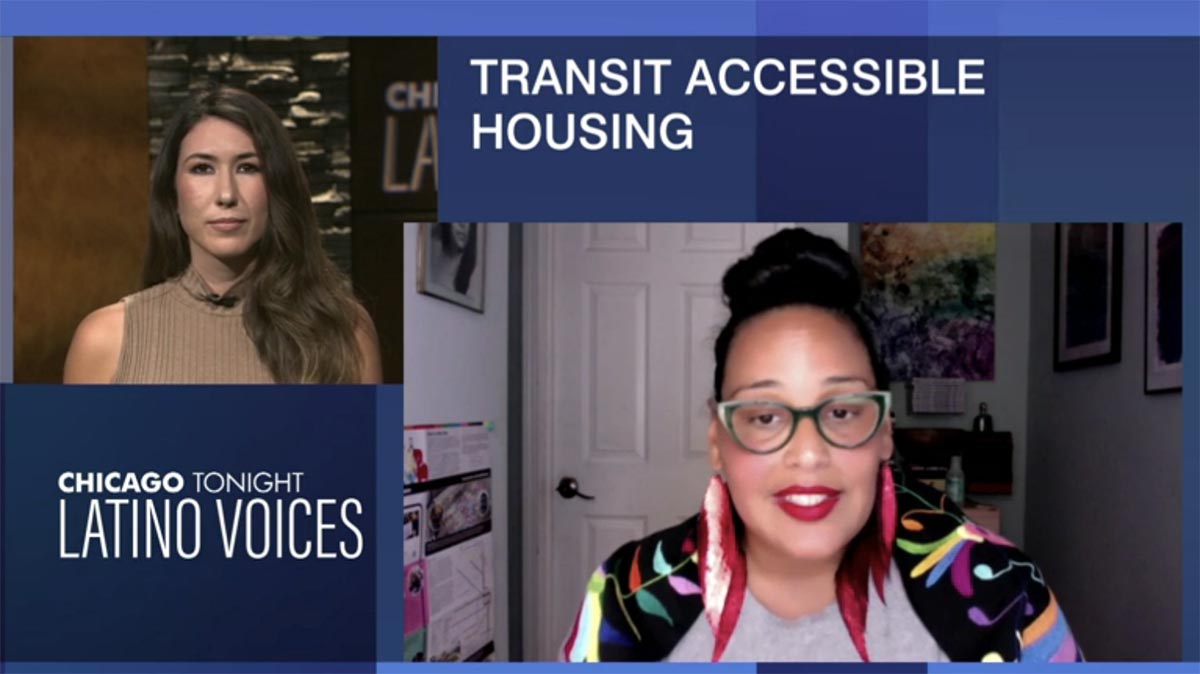
We have 3 goals: more equity, more transit orientation, and more development. The Connected Communities Ordinances expands the Equitable Transit Oriented Development zone from a quarter to a half mile around train stations and includes high-frequency bus corridors… incentivizing developers to come to our communities and build there.
Leslé Honoré, former Managing Director for Strategy and Communications,
on Chicago Tonight, July 2022
Changing the zoning code by passing the Connected Communities Ordinance in July is a key step to changing how Chicago grows as a city.
The ordinance changes some prior mandates, for example reducing the number of mandatory spots to park cars and requiring some facilities to park bicycles. It also makes possible new incentives to support development in transit-rich parts of the city.
Since passage, for example, the city announced a $10 million pool of funds to support new and emerging developers seeking to work in Equitable Transit Oriented Development areas. It also granted $1 million for technical assistance and consulting to a new group of nonprofits and firms to support those developers. The new group, known as Elevated Works, is convened and led by CNT.

Our message is simple: transportation agencies need to better involve community-based organizations in their work, with respectful relationships and fair compensation. But what do we need to do to get there?
Heidy Persaud, Director of Transportation Equity
Decisions by transportation agencies have often harmed communities that have not been in positions to advocate for themselves or contribute to decision making. This report explored what it would look like to do things differently.
For this project, CNT convened leaders from local organizations citywide and representatives from two major transit agencies, Metra and Chicago Department of Transportation. The resulting project modeled good process by soliciting substantive input from local groups and compensating them for their time. The publication highlights best practice findings that other transit agencies can use.
Read the publication | Read more about our work to help transit agencies build local capacity

We know there is so much more that can be done with the H+T Index. Questions like: how can we explore how location efficiency affects affordability for people of color and low-income populations and how can the index be used effectively to create more equitable communities?
Preeti Shankar, Managing Director, Urban Analytics
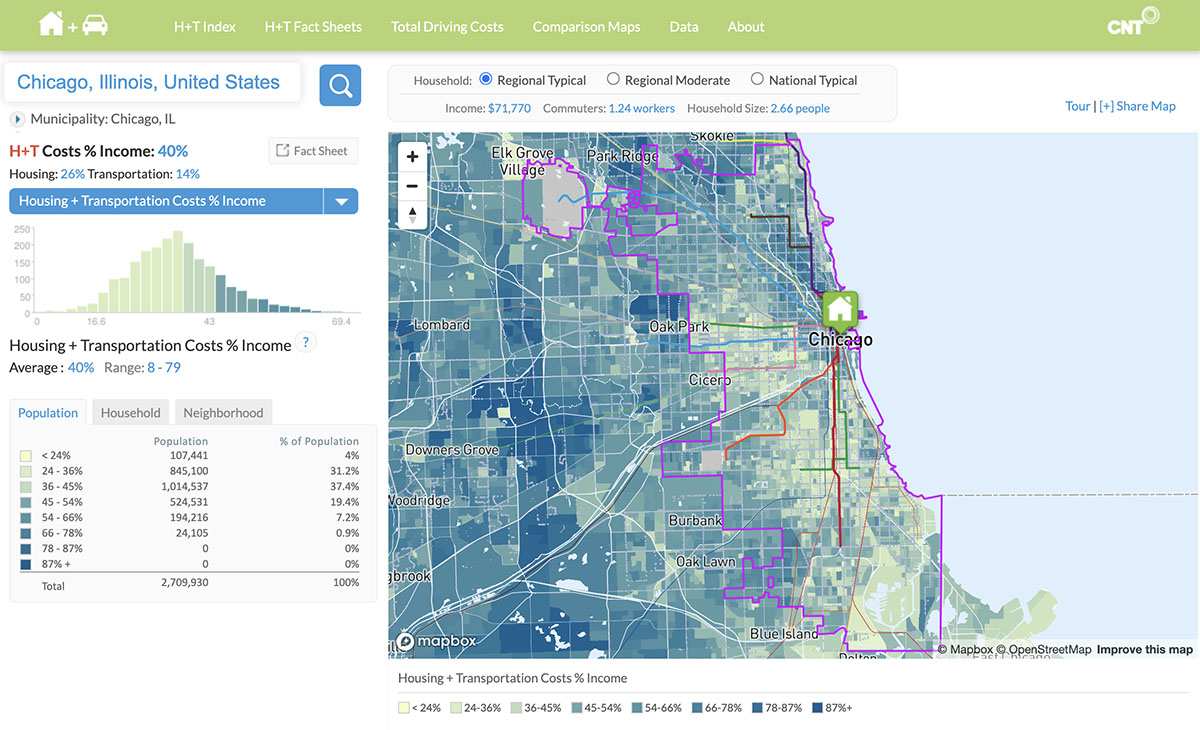
With thousands of users each year, the H+T Index offers an expanded view of affordability, one that combines housing and transportation costs and sets the benchmark at no more than 45% of household income. For its 16th birthday in 2022, the Index received a major data update, with added information coming from:
The pandemic-era 2020 H+T Affordability Index tells an interesting story. With such an anomalous year the Urban Analytics team decided to supply user data for several different time periods. This allows users to compare data over time and reflects the state of our built environment rather than emergency policy interventions. Several scenarios and multiple years of data are now available for download.
Read more | Use the new H+T Index
In 2022, our Urban Analytics team created or updated several tools in partnership with organizations in Chicago and across the country:
Metropolitan Planning Council and CNT jointly launched a new Equitable Transit-Oriented Development Calculator that lets users define a detailed building plan for a parcel and understand the building’s impact on the community: greenhouse gas emissions, on-site jobs, tax revenue, number of residents housed, and others. Each organization had been offering its own calculator, so we decided to combine our tools for users’ convenience.
Team NEO and the Lincoln Institute of Land Policy asked CNT to lead analysis and development of a first-of-its-kind Environment, Social and Governance (ESG) tool for Northeast Ohio businesses compare development sites across Northeast Ohio against factors related to racial equity, climate change and access to talent.
Front and Centered turned to Center for Neighborhood Technology to build The Washington Transit Access Map to help area residents, advocates, and others to understand where transit is most reliable, who has access, and who doesn't in Washington State.
CNT also developed a phone app version of the Consortium to Lower Obesity in Chicago Children (CLOCC) Neighborhood Walkability & Accessibility Assessment Tool. The tool provides community-based organizations with an instrument to gather data to support requests to the City of Chicago for local pedestrian infrastructure investment.
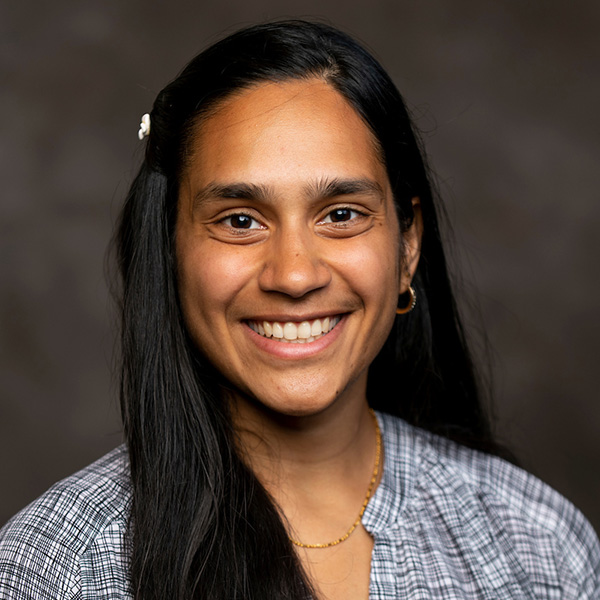
What does authentic collaboration look like? For us, it includes inclusivity, flexibility and accommodation, and building on organizational assets.
Cyatharine Alias, Manager, Community Infrastructure & Resilience

When Cook County received federal infrastructure funds as part of the Biden administration’s post-pandemic investments in communities, they looked for areas of need and organizations with the ability to help. One opportunity selected for investment was the resident driven RainReady flooding plans Center for Neighborhood Technology facilitated in 2017.
In 2022, the Cook County Department of Environment and Sustainability allocated $6 million in federal grant money to implement green infrastructure projects in six flood-prone communities known as the Calumet Corridor: Blue Island, Calumet City, Calumet Park, Dolton, Riverdale, and Robbins. Building on those plans previously developed, Center for Neighborhood Technology is working with residents to prioritize flood prevention projects that fit within the $1 million budget for each town.
The RainReady grant is CNT’s largest project to date, unfolding over the next several years into 2026. Greenprint Partners, the green engineering firm that shares office space with Center for Neighborhood Technology, is collaborating on construction management and project design.
CNT also focused attention on how we conduct our climate and racial justice work by investing more time and resources in collaborative work with front-line organizations.
CNT partnered with Little Village Environmental Justice Organization (LVEJO) to co-research and write a Little Village Water & Health Report. Comparisons of the Little Village community to the Near North Side and the city proved even more stark than expected.
The study helped fuel local and citywide organizing for a city Department of Environmental Justice and other recommendations driven by a resident survey as well as quantitative analysis. Leaders of LVEJO held one of their first public meetings since the onset of the COVID-19 pandemic to share results from the report with the local community.
Read the Water & Health in Little Village Report (updated fall 2022)
Another outcome from this collaboration was a guide for front-line organizers, advocates, community researchers, and other leaders, the Geographic Information System (GIS) 101 Toolkit for Environmental Justice Organizations and Allies. LVEJO and CNT developed the guide while a third partner, Milwaukee Water Commons, tested the tool as it was developed to help ensure other front-line organizations would find it useful.
We welcomed Olga Bautista, Rick Guzman, and Katanya Raby to the Board of Directors. These three new members all hold leadership roles in local community-based organizations, reflecting an intentional effort to increase representation from the communities we serve.
CNT was pleased to welcome several new team members:

Shavion Scott joined as Managing Director of Urban Resilience from Austin Coming Together, where she was deputy director. Shavion leads the organization’s work to advance urban climate resilience, sustainability, and equitable water systems.
Lucia Geglio joined us from Arabella Advisors and is our new Director of Operations and Finance. Lucy has worked in nonprofit financial management for over a decade and has supported the development of financial systems for a variety of organizations, including grassroots community groups, donor advised funds, and national nonprofits.
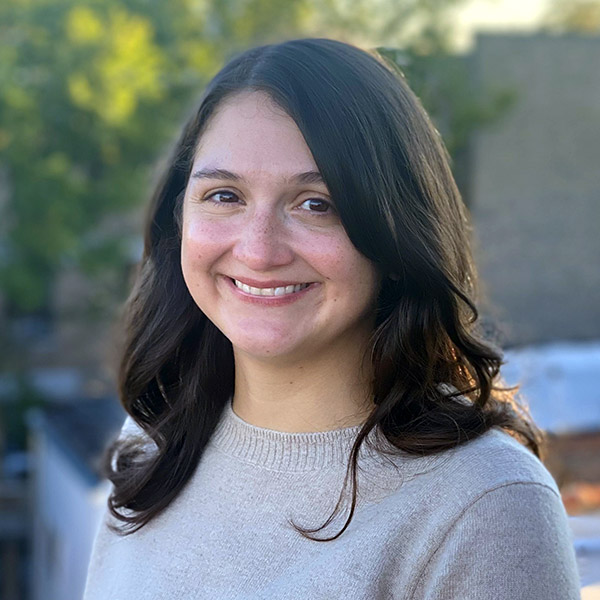

Emily Laflamme joined Urban Analytics team as a Senior Analyst. She was previously at American Medical Association’s Center for Health Equity and the City of Chicago’s Department of Public Health. Her work focuses on making a public health argument for environmental justice, affordable housing, accessible transit and equitable community development.
Also in 2022, staff members took part in training to receive certification as Conscious Ambassadors of Trauma Informed Care through a 9-hour course led by Hansra Consulting and Advisory Services.
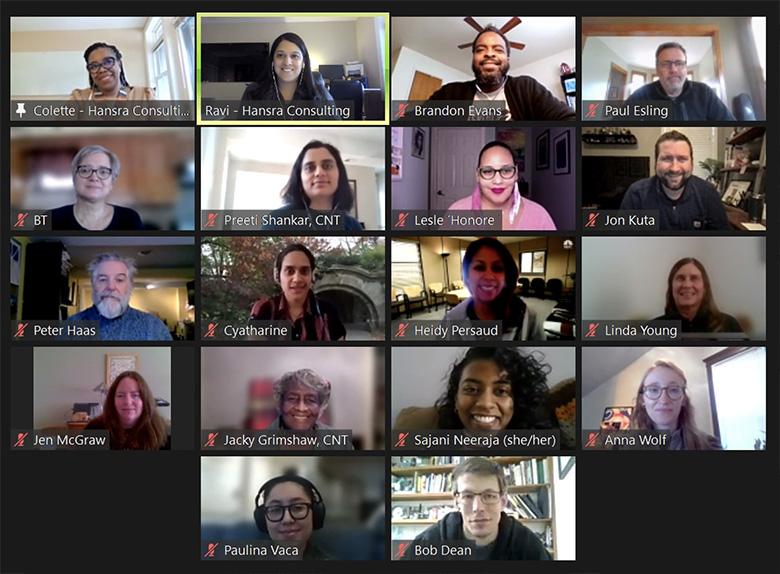
Marvin Collins Award for Carrboro’s Comprehensive Plan
The American Planning Association-North Carolina Chapter recognized the Town of Carrboro with its Marvin Collins Award for a comprehensive plan developed for a community of less than 25,000 population. The Carrboro town council unanimously adopted the plan in June. Heidy Persaud and Cyatharine Alias from the staff led the plan’s Infrastructure and Environmental chapters and helped with outreach.
Transportation Research Board honors Jacky Grimshaw
Vice President of Government Affairs Jacky Grimshaw was recognized with the Sharon D. Banks Award for Humanitarian Leadership in Transportation. The award goes to individuals who “exemplify a caring nature and depth of character in relation to those who use, deliver and support transportation services.” Jacky received the award in January at the 101st Transportation Research Board meeting in Washington, D.C.
Thanks to all of the funders, project partners and friends who supported CNT in 2022. We were generously funded by the following organizations and individuals:
0 to $499
$500 to 4,999
$5,000-24,999
$25,000 to 99,999
$100,000 and more
Board of Directors
Staff